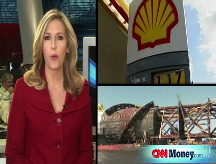Oil rises as OPEC cuts production
A recent survey shows near-70% compliance among oil producers with the organization's 4.2 million barrel-per-day production cut.
NEW YORK (CNNMoney.com) -- Oil prices rose Tuesday as signs of OPEC production cuts began to emerge. But gains were tempered as the group fell short of its pledge and the economy continued to show weakness.
U.S. crude for March delivery ended the day up 70 cents to $40.78 a barrel in New York.
The Organization of Petroleum Exporting Countries pumped an estimated 26.23 million barrels per day in January, down from 27.24 million the month before, according to a Reuters oil company survey Tuesday.
"I think it's a positive surprise so far," said Tom Orr, head of research for trading firm Weeden & Co. But, he added, "We still need to see what February looks like."
OPEC, whose members produce about 40% of the world's crude, has been scrambling to put a floor under prices as a weak global economy stifles demand, sending prices plummeting from a record high of $147.27 a barrel last summer.
Cut compliance: OPEC pledged in December to cut production by 2.2 million barrels a day during the month of January, on top of a previously announced cut of 2 million barrels per day last year.
According to the Reuters survey, the group has met about 67% of the total 4.2 million barrel-per-day cut. OPEC is well-known for exceeding production cut goals, and analysts were not surprised that the group did not fulfill its targets, but the compliance levels were "pretty good," according to Orr.
He said investors had been worried that OPEC's top producer, Saudi Arabia, would shoulder the bulk of cuts.
According to the Reuters survey, compliance was uneven, with major OPEC producers Iran and Venezuela, whose economies rely more on oil profits, exceeding their production targets. But Reuters data has shown that nearly all OPEC nations are cutting production.
Economy and demand: Despite the reduction in supply, investors still remain pessimistic about oil demand as the global economy continues to slide.
"It's unclear still how much demand will drop off," said Orr. OPEC may need to make additional cuts through 2009 if it wants to keep oil prices from falling further, he added.
The collapse of the U.S. real estate and mortgage markets were two of the initial triggers for the world's economic trouble.
Job losses also continued to mount as companies in a variety of industries announced more layoffs - with more than 8,000 job cuts announced on Tuesday.
Crude stockpiles: The downturn in demand from the troubled economy has caused a large buildup in supplies of unused crude.
The government is expected to report Wednesday that supplies of crude oil rose by 2.9 million barrels last week, according to a poll of analysts from research group Platts.
Gasoline: As the price of oil ticked upward, the price of gasoline at the pump also rose Tuesday. Gas was selling about 1 cent higher at $1.89 a gallon on average, according to a daily survey of gas station credit card swipes from motorist group AAA. ![]()



